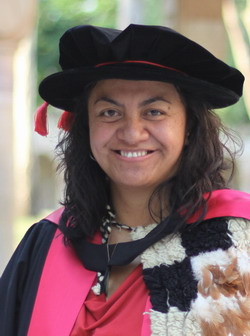Plant and food biologist Dr Jonni Koia (Tainui, Ngati Whawhākia) is returning to New Zealand after many years across the ditch to investigate the potential of traditional Māori herbal medicines to help combat type-2 diabetes.
Dr Koia has taken up a research position at the University of Waikato to carry out this study after receiving a Health Research Council of New Zealand (HRC) Māori health research postdoctoral fellowship valued at more than $425,000. Her study is one of 16 Māori career development awards announced today in the HRC’s latest funding round.
Previously based at the University of Queensland in Australia, Dr Koia has more than 15 years’ experience in molecular biology and biotechnology related to plant and food research. While in Queensland, she led the first large-scale gene expression study to identify numerous genes involved in pineapple ripening and other important processes, such as those involved in anti-oxidant and vitamin C production. Now, with this HRC award, she is turning her attention to rongoā rākau (Māori herbal medicine) with known anti-diabetic properties.
Dr Koia says New Zealand’s indigenous flora is one of the most unique and diverse in the world, with many species of indigenous flora having rongoā or medicinal properties that Māori have used for hundreds of years. She says as yet, New Zealand’s rich collection of flora, rongoā rākau has not been clinically evaluated and tested for their use in treating type-2 diabetes.
“Māori herbal medicines have provided relief for many common ailments and chronic conditions over centuries where mātauranga Māori (traditional knowledge) holds significant importance. Given New Zealand’s unique indigenous flora, the plant vegetation foods, seeds, roots, nuts, and fruits that formed the basis of traditional Māori diet and rongoā rākau seem worthwhile targets in a systematic search for anti-diabetic agents,” says Dr Koia.
Diabetes has doubled in New Zealand over the past 10 years from 125,000 cases to 250,000, with the majority of new diagnoses – 90 per cent – type-2 diabetes. The number of Māori with diabetes was low before European settlement; however today type-2 diabetes is 2.5 times more prevalent in Māori compared with non-Māori, with adaptation to a western style diet a contributing factor.
Dr Koia says she hopes to find new anti-diabetic agents in these natural products that stabilise blood glucose levels without the adverse side effects of current anti-diabetic drugs such as weight gain, heart failure and fluid retention.
She says a vital part of this project will be safeguarding the mātauranga Māori for rongoā rākau through active collaborations with rongoā rākau practitioners and advisors, Māori elders, and members of trust boards such as the governing body of rongoā Māori, Te Kāhui Rongoā Trust.
“I’m very grateful and honoured to receive this fellowship. I’m grateful for the opportunity it will provide to return home with my young whānau and to give back to my whānau, hapū and iwi. I look forward to contributing towards advancing rongoā rākau and safeguarding mātauranga Māori for the betterment of our people as a whole in Aotearoa,” says Dr Koia.
HRC Manager of Māori Research Investment Stacey Pene says natural products are an important source for drug discovery, with an estimated 25 per cent of all current prescription drugs derived from plants.
“We’re delighted to have helped attract Jonni back to New Zealand through this career development funding. Her study will further advance her knowledge of rongoā rākau as a means of benefiting Māori health and help provide robust scientific and clinical research to identify and validate any active anti-diabetic agents that might be found,” says Mr Pene.
See below for the full list of Māori career development award recipients or to read lay summaries of the research projects, go to our research repository and filter for ‘Māori Health Research,’ and ‘2017’.
2017 HRC Māori career development awards
Māori Health Postdoctoral Fellowships
Dr Alayne Hall, AUT University
Tūhono Māori: Promoting secure whānau relationships for traumatised mokopuna
36 months, $389,154
Dr Jonni Koia, University of Waikato
Te reo tipu - a bittersweet quest for new anti-diabetic agents in rongoā rākau
48 months, $425,562
Erihapeti Rehu-Murchie Fellowship
Dr Jade Le Grice, the University of Auckland
Becoming sexual beings: Māori recommendations for sexual violence prevention
36 months, $365,885
Māori Health PhD Scholarships
Ms Debra Gerrard, AUT University
Taiohe and whānau entering acute mental health with alcohol and drug issues
36 months, $110,742
Mrs Melanie MacFarlane, the University of Auckland
Key influences for bed sharing and the relationship with SUDI
36 months, $111,550
Māori Health Masters Scholarship
Mrs Sonia Hawkins, the University of Auckland
Senior nurses understanding of health equity
12 months, $20,338
Māori Health Knowledge Translation Grants
Dr Tess Chalmers, Independent researcher
Māori self-reported wellbeing versus informant-reported wellbeing
6 months, $5,000
Dr Stephanie Palmer, Tumana Research Services
Community mobilisation potential and possibilities for violence prevention
6 months, $5,000
Māori Health Development Grants
Dr Stephanie Palmer, Tumana Research Services
Community support for a community mobilisation model of violence prevention
6 months, $10,000
Dr Stephanie Palmer, Tumana Research Services
Housing, violence and ancestral land
6 months, $10,000
Mr Andrew Sporle, Independent researcher
Te hao nui, he hao komarohi
6 months, $10,000
Māori Health Summer Studentships
Miss Mairarangi Haimona, University of Otago, Dunedin
Otago Māori medical student perspectives on cultural development
10 weeks, $5,000
Miss Nadine Houia-Ashwell, University of Otago, Dunedin
A survey of non-Māori health professional students at Te Whare Wānanga o Otāgo
10 weeks, $5,000
Miss Casey Te Rangi, Te Whānau o Waipareira Trust
Health and service delivery needs of the Turangi Māori community
10 weeks, $5,000
Mr Jordan Tewhaiti-Smith, University of Otago, Dunedin
Tāne in the health workforce: A students’ experience of supporting factors
10 weeks, $5,000
Mr Daniel Thompson, University of Otago, Dunedin
A qualitative look at Tikanga best practice guidelines in New Zealand district health boards
10 weeks, $5,000
